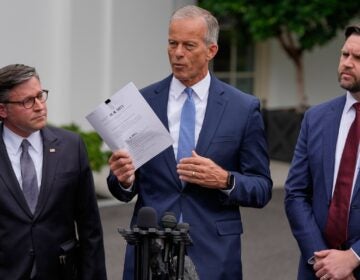These are some of the people who’ll be impacted if the U.S. defaults on its debts

Cole Lyle (left), a Marine Corps veteran and executive director of the veterans advocacy group Mission Roll Call, says a U.S. default would have devastating consequences for former military members who stand to see their benefits suspended. (Courtesy of Cole Lyle)
Veterans, seniors and government employees: These are just some of the people who stand to be impacted if Congress fails to raise the debt ceiling.
Treasury Secretary Janet Yellen warns that without additional borrowing authority, the U.S. could run short of cash to pay its bills as early as June 1.
A default would send shock waves through the global economy and financial markets.
It would also be felt very directly by ordinary people.
Veterans
One of the first big bills coming due on June 1 is $12 billion in veterans benefits. If there’s not enough money on hand to pay those benefits, people who’ve already sacrificed a lot for their country will be forced to sacrifice even more.
“These are people on very low, sometimes fixed incomes that rely on these payments as a lifeline to pay for housing, to pay for food, to pay for expenses for children and other family members,” says Cole Lyle, a Marine Corps veteran and executive director of the veterans advocacy group, Mission Roll Call. “So it could be potentially very crippling.”
The government is also scheduled to pay $12 billion in military and civilian retirement benefits on June 1.
If those payments are delayed for any length of time, people with little or no savings might have to turn to credit cards, which carry increasingly costly interest rates.
“There is no good that comes from a default,” Lyle says. “Either to veterans, to active-duty service members or other Americans that rely on benefits from the United States government.”
Retirees
The government is scheduled to pay $25 billion in Social Security benefits on June 2 — one of several big payments the program will make over the course of the month.
Marilyn Ayers is one of the millions who gets these benefits, and she worries about what will happen if the government doesn’t have enough money to cover those obligations.
“That will really be a catastrophe,” says Ayers, a retired chemist who lives in Douglas County, Colo.
“We’d be in trouble,” her husband Keith, a retired machinist, chimes in. “We have too many bills.”
The couple, who are in their 80s, don’t have pensions to fall back on. They count on Social Security to help pay their mortgage and buy groceries.
“We’re ordinary American families and I feel anger because we’re being held hostage to a type of blackmail that’s going on right now,” Marilyn says. “We’re not the ones that are out on the street with the signs or anything like that. But we vote.”
The Ayers also worry about how a government default might affect the already fragile housing market. The couple plans to sell their home in about nine months and move to a new, senior housing complex.
“It’s being built as we speak,” says Marilyn Ayers.
Would-be homebuyers
The real estate website Zillow estimates that a prolonged government default could send mortgage rates soaring as high as 8.4%, from about 6.4% today.
That would put homes out of reach for hundreds of thousands of would-be buyers.
“This scenario would be like a one-two punch hitting homebuyers who are already reeling from the affordability challenges this year in the market,” says Jeff Tucker, a senior economist at Zillow. “That would discourage a lot of sales.”
U.S. government debt has long been considered the bedrock of the financial system. If lenders start to worry about cracks in that foundation, it would make all kinds of other borrowing more expensive.
“If that gets shaky, that sends earthquakes out through the whole credit system,” Tucker says.
A default that was remedied in a day or two might have muted effects. But if government bills go unpaid for weeks or months, it could have a lasting effect on interest rates.
“Would that cause a permanent increase in borrowing costs?” Tucker asks. “We don’t really know for sure. And I think, frankly, that’s all the more reason not to find out.”
Everyone else
Other payments would also be in jeopardy if the government’s borrowing limit is not increased soon, including:
— $47 billion for Medicare providers, due on June 1.
— $1 billion in tax refunds, set to go out June 7.
— $4 billion in federal salaries, payable on June 9.
And the list goes on. Food stamp recipients, education programs and defense contractors could all be left empty-handed.
Veterans advocate Lyle says this is what ordinary people find so frustrating about the gamesmanship playing out in Washington.
“What I’m hearing from veterans is just be the adults, get into a room, and do your jobs that we elected you to do,” Lyle says.
“We can debate spending levels all day long, and personally I think the federal government does spend too much money,” he says. “But the deadline is coming and it threatens to affect personal lives in a very real, real way.”
9(MDAzMzI1ODY3MDEyMzkzOTE3NjIxNDg3MQ001))




